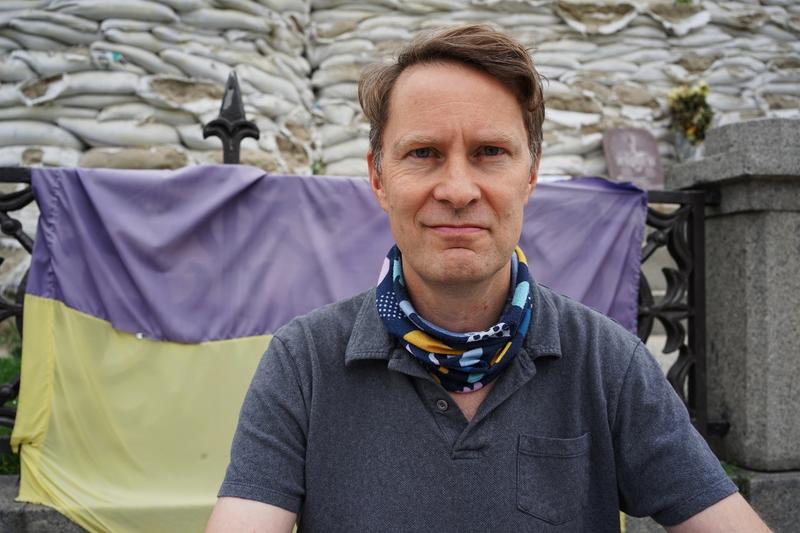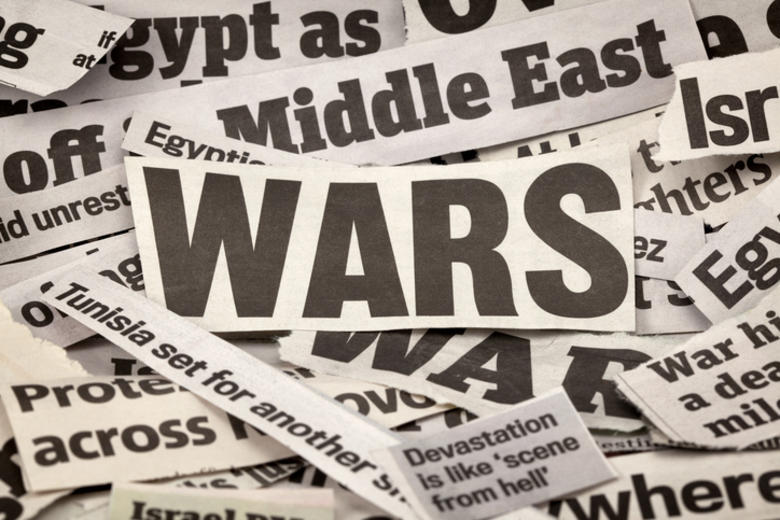LUKE HARDING DISCUSSES UKRAINE

LUKE HARDING DISCUSSES UKRAINE
The Guardian newspaper’s foreign correspondent discusses Russia’s invasion of Ukraine
Published: 26 June, 2023
Author: Richard Lofthouse
Share this article
Updated in mid-June in paperback form, Luke Harding’s (Univ, 1987) Invasion is a remarkable account of Russia’s invasion of Ukraine.
Centrally, he’s achieved the seemingly impossible task of generating a profound and supple commentary on the invasion that drew on years of experience as Guardian Moscow correspondent, while at the same reporting on the ground, often at great risk to his own safety.
It starts in Kyiv the evening before the invasion, 23 February 2022, with Luke in Kyiv having been banned from Russia since 2011, enjoying a bowl of borschch with famous Ukrainian novelist Andrey Kurkov and a few friends.
In QUAD’s meeting with Luke for this feature, he says that since December 2021 it had become fairly obvious to many people on the ground, that things were building towards a major event.
The war in the eastern parts of Ukraine, long entrenched since Russia’s illegal annexation of Crimea in 2014 yet inexplicably tolerated by the West, had been heating up in the preceding weeks, while huge troop build-ups observable from space painted their own ominous picture.
Kurkov, apparently, was fairly optimistic.
Luke writes of his own view that night, ‘The omens pointed in one scarcely believable direction: Russia was about to invade Ukraine.’
The book goes rapidly from there, and with real pace.
The author never blinks, his own eyewitness to what was unfolding, whether the first Russian troop movements through the still-radiated forests of Chornobyl north of Kyiv, or through the eyes of relatives of the victims of civilian massacres in the north-western suburbs of Kyiv such as Bucha and Borodyanka, or indeed following the Azov Regiment in its three month long defence of the besieged Azovstal steel works in Mariupol, far down in the South-East corner of Ukraine overlooking the Sea of Azov (there are amazing photos of the steelworks too).
Without wearing the effort too heavily, Harding also manages to scan backwards and forwards in history, anchoring fragmentary episodes in a much deeper understanding of the Russian mindset having previously served as Guardian Moscow Bureau Chief 2007-11, (‘A difficult four years…’ he says).
Luke reminds us, for instance, how the Pentagon’s first position was that Kyiv would fall after a month or so, leading the US position initially be a cautious one, very much with the recent Afghanistan debacle in mind, where the hurried withdrawal of Western forces had allowed the Taliban to hoover up US weaponry worth billions.
Ukraine’s unexpected resistance to the Russian invasion, however, allowed former Ukrainian defence minister Zagorodnyuk to fly to Washington and turn the American mindset towards a $40 billion defence aid package.
As usual Luke knows the man personally and it is this amazing sense of being in the front row of history that puts his book up there among the great works of war journalism.
He notes also that the American stance of caution, regarding escalation and not forgetting the nuclear capability of Russia, simply wasn’t one that the Ukrainians or he recognised.
Luke’s own position on this threat was that the use of nukes was unlikely ‘given his [Putin’s] paranoia about his personal survival,’ as evidenced by the absurdly long table he cowered behind during Covid, and at the time of publication his apparent disappearance following the aborted insurrection of Wagner troops on 23-24 June 2023.
Plus – and this has so far been borne out by accounts of the oligarchs having a fine time on their yachts in Turkish ports, resistant to sanctions – ‘his Kremlin colleagues enjoyed the good life…’
In other words it was a war that was going to be fought by Russian mercenaries, by Russian hydrocarbon wealth and by prisoners and ordinary soldiers some of whom have been conscripted against their wishes, but in a society riven by extreme inequality detailed in one of Luke’s eight previous books Mafia State: How One Reporter Became an Enemy of the Brutal New Russia.
Germany on the other hand was (and seemingly remain) desperately slow to get their act together while we discover that Mario Draghi’s loss of office in Italy was a blow to Ukraine, and French President Macron has been a troublesome ally, being something of a Russia appeaser.
In a broader sense, Luke makes clear, the leftwing intelligentsia in many Western countries, particularly Germany but recognisably in the UK too, were simply caught up in a time warp of their own making, confused as to what Russia had become in the three decades since the implosion of the Soviet Union in 1991 and still liable to think of the place as broadly ‘Communist’, a matter played on cynically by Putin when in some occupied Ukrainian towns he encouraged Kremlin-approved officials to court the nostalgia of elderly Ukrainians by resurrecting statues of Lenin.
Luke writes as lucidly as any top historian on the importance of recognising that Ukraine had its own identity even within the Soviet Union, and that ‘the Nazis exterminated 6.5 million Soviet Ukrainians’ - but we have generally fallen for the Russian line that the horrific Soviet war casualties of World War II were ‘Russian’, a sneaky swerve that swept all the non-Russian Soviet republics under the carpet of a single ‘Great Patriotic War,’ both at the time and since.
An English student at Oxford, Luke says that his wife, freelance journalist and writer Phoebe Taplin, (Univ, 1987) also read English and that they went together to Moscow in 2007 with their two children – despite being subjected to intrusive surveillance from the FSB, Russia’s security agency.
By then he had intensively learned Russian, in Oxford in 2006, noting that ‘It was much harder than getting an English degree’. After the Moscow stint, which culminated in Luke being deported by an angry Kremlin, he returned to Nuffield College as Research Fellow in 2014 after publishing the Snowden Files. ‘Nuffield ran an intelligence seminar there and I met several Guardian-reading ex-employees from GCHQ…’
As journalists go Harding deserves all the gung ho gongs: previous books include A Very Expensive Poison: The Assassination of Alexander Litvinenko and Putin’s War with the West; Collusions: Secret Meetings, Dirty Money, and How Russia Helped Donald Trump Win; and Shadow State: Murder, Mayhem, and Russia’s Remaking of the West.
He says that he got part of the way in finding out where some of the off-shore money came from for the Brexit campaign, with suspected Russian links still hanging rather heavily in the air. ‘We will never be able to know for sure what exact influence they [Russia] had over the final vote.’
Beyond the raw reporting, the current book Invasion also manages to kindle a gentler curiosity about Ukrainian identity and culture, which is also an antidote to the horror.
Harding has this super chapter called ‘Horizontal’ in which he starts to unpack why Ukraine and Ukrainians have won so many hearts – their extremely strong civil society tradition, their resourcefulness and fortitude in the face apparently of overwhelming odds, and the way we have read about volunteer soldiers and civilians fund raising among themselves for drones and guns and vehicle spare parts and medicine.
And then the novelist Andrey Kurkov pops up again - try his Grey Bees if you want a novel - who says that Ukrainian’s are 'freedom-loving individualists who dislike being told what to do…’
Going back especially to the Holodomor, the Stalin-engineered famine that killed 2-3 million Ukrainians in the early 1930s, and also referencing deeper Ukrainian history and the role of Cossack culture and that wide open steppe, Ukraine is structured horizontally, argues Luke.
People look after each other and the current conflict has to a large degree been contested as a voluntary effort, seen both as a civilian engagement and a military one. Ukrainian soldiers have been allowed to take their own initiative on the battlefield in ways that Russian soldiers have not.
Russia by contrast is ‘vertical’ and autocratic, with everything referencing upwards to the Tsar or, for now at least, Putin. That was the deep point about the Ukrainian popular revolution of 2013-14, the Maidan uprising. Ordinary Ukrainians overthrew the Russia-leaning Ukrainian President Yanukovych.
How did this book get written given that Luke was reporting on a live war? He was given some leave after a hard run in the Spring-Summer of 2022.
‘I needed to write as a form of therapy and did so without break until the book was done.’
The original hardback came out last November, followed on 15 June 2023 by a paperback with the addition of a new chapter.
The book was also shortlisted for the 2023 Orwell Prize for Political Writing, which was awarded on 22 June to Peter Apps for Show me the Bodies How we Let Grenfell Happen.
Just hours after the prize giving, Luke raced back to Ukraine to resume his reporting, just hours ahead of the Russian mercenary unit Wagner’s ‘March on Moscow.’
Invasion: Russia’s Bloody War and Ukraine’s Fight for Survival by Luke Harding (Guardian Faber, 2022, PB 2nd Edition June 15, 2023). The book is available for a 20% discount through the Guardian bookshop















